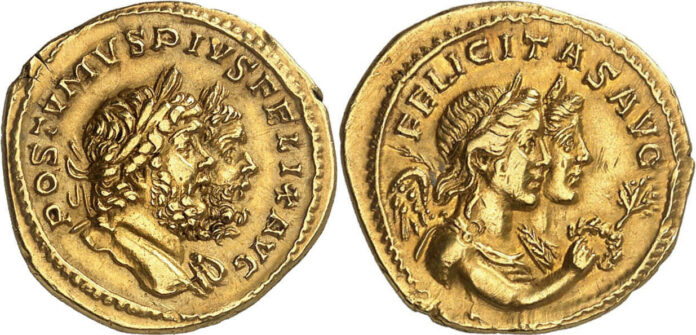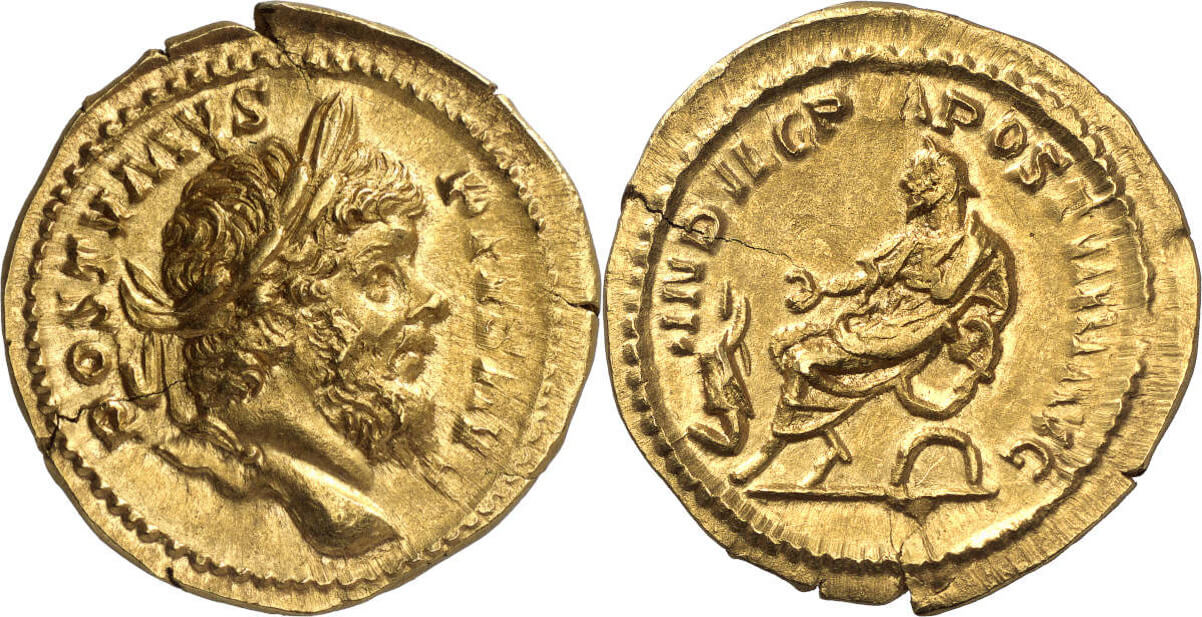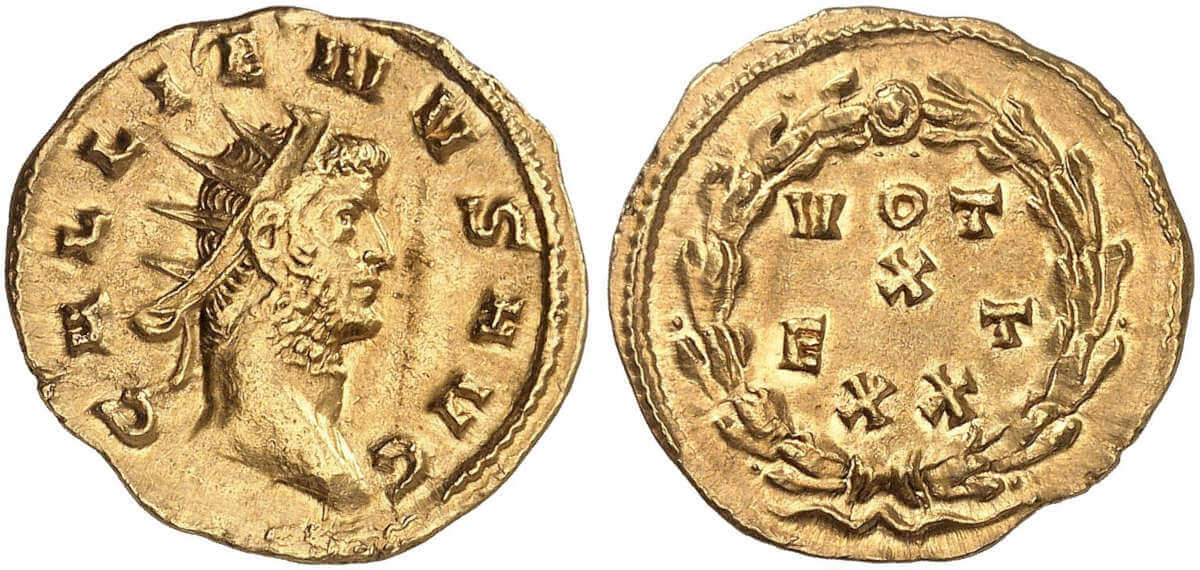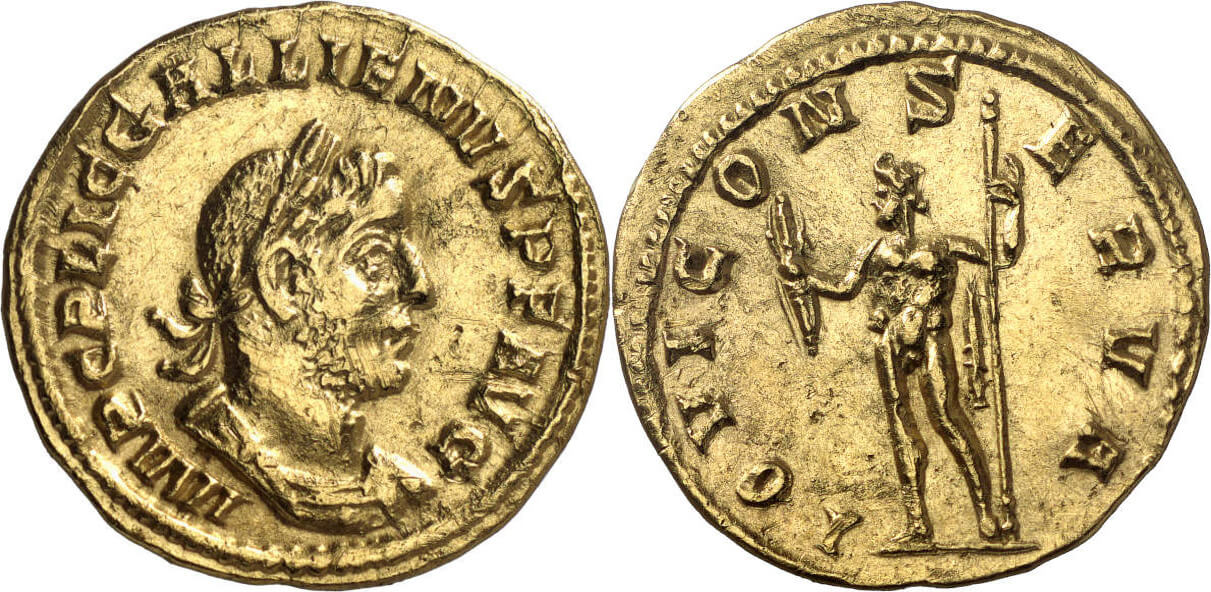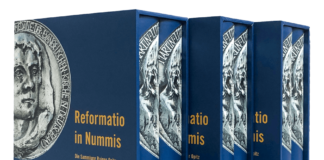Like Roger Wolf, many collectors strive to achieve the goal of owning a gold or a silver coin of every emperor. While one can accomplish this task rather quickly with regard to the Twelve Caesars or the Adoptive Emperors, it is downright impossible to own a coin of every emperor of the 3rd century. There were simply too many usurpers, counter-emperors and co-emperors.
Moreover, this period suffers from a lack of emotions associated with it. There are too few written sources. There was no Tacitus or Cassius Dio to provide us with rhetorically ingenious character studies of Valerian or Postumus. As a result, we tend to severely underestimate the men who tried to protect the Roman border in the second half of the 3rd century. After all, accepting the title of emperor required much more courage and sense of duty in this era than in the rather untroubled times of the empire.
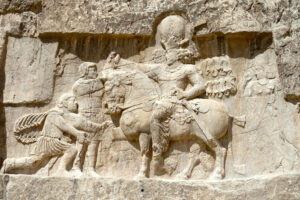
You will find an extensive offer of gold coins by the barracks emperors in Künker’s auction catalogs 382 and 383. We seize this occasion to take a closer look at the lives of some of these rulers. When taking office, they all knew that they would not live to enjoy a long and especially not a happy life. As soon as the army proclaimed someone Augustus, he would often die within a few weeks. Some of them managed to survive for a few years, during which they did not stay at luxurious palaces but military camps. Today, we have far too little admiration for men such as Valerian, Gallienus or Postumus, who fought at the head of the legionaries to preserve the Roman way of life. They all were highly capable leaders who failed to accomplish an impossible task.
How It All Began
From the second half of the 2nd century onwards, an increasing amount of peoples moved from the barren north to the prosperous south. This development was probably due to climate change. They considered the Roman Empire an easy and attractive prey. The so-called Antonine Plague had significantly reduced the number of its inhabitants. Fertile land and wealthy cities enticed them to settle there – or at least to plunder. The only effective wall between the invaders and the Roman citizens were the legionaries, whose loyalty became more and more important to the emperor, who was the supreme commander of the army.
When the emperor was too far away and the enemy too close by, a usurper or counter-emperor was appointed to take over the supreme command in case of emergency. It was not ambition that drove all these officers to call themselves Augustus – it was necessity. The office came with the powers that were needed to set up an effective resistance right there and then.
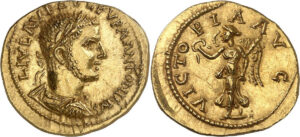
Uranius Antoninus
A perfect example for this is Uranius Antoninus. The only verified information we have about him is that he was a priest of a local cult who led the men of Emesa in 253 to defend their homeland against the Sasanians. He never laid claim to ruling other regions. And yet, he had to expect that his usurpation would cost him his life. In fact, we do not know what happened to him when Valerian moved eastwards and regained control of Emesa. Uranius Antoninus disappeared from history in the spring of 254. Today’s historians like to imagine that he withdrew to private life. But we may well question whether Valerian could afford to let a potential rival live.
Therefore, putting yourself at the head of the army was not an honor, not a privilege – it was Russian roulette, it was sort of a deferred death sentence that those concerned accepted with stoic equanimity.
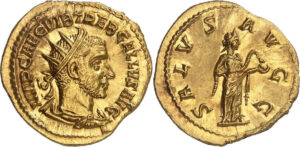
The Dilemma: Too Many Fronts, Too Few Soldiers
Every emperor had to face the problem that there were too many fronts. How should the scarce resources be allocated? This dilemma claimed the life of Trebonianus Gallus. The army that defended the northeastern front from the Goths refused to send urgently needed troops to the east. This resulted in an uprising. Aemilian was proclaimed counter-emperor, Trebonianus Gallus was assassinated by his own officers.
The Senate considered Valerian, an experienced soldier and administrative officer, a promising man to get this crisis under control. He became emperor in 253 and, in fact, initiated a new strategy: he separated the empire into a western and an eastern half. He assigned his son Gallienus to protect the western half and took over himself the much more vulnerable eastern border. In this way, he made sure that the exchange of military troops could proceed without too much resistance and he thus anticipated Diocletian’s great administrative reform.
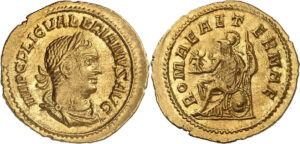
A Roman Emperor as a Sasanian Prisoner of War
When Valerian dedicated this aureus to eternal Rome – Roma Aeterna – it seemed like it was still possible to save the Empire. Roman citizens were pleased to have a breather from the war. They trusted Valerian’s new Sasanian strategy, for which he had set up a large camp at Samasota. This was close enough to the Sasanian border to be able to get there quickly, but far enough in the rear not to fall victim to a surprise attack. The emperor established a new mint here, where aurei and denarii were produced to pay the legionaries.
However, as early as in the spring of 260, the Sasanians crossed the border again under the leadership of Shapur. Carrhae was lost, Edessa besieged, and when Valerian marched against Shapur at the head of the relief army, the unbelievable happened. What exactly that was? The sources contradict each other. Shapur himself had recorded that he captured Valerian during the battle. Roman authors, on the other hand, speak of treachery and an ambush. Which version is correct? We do not know that. The Roman story aligns a little too well with their world view. After all, the Romans believed that their gods helped their emperor fight his just war. Therefore, it was easier to blame his defeat on treason than to doubt their own gods.
Valerian’s capture was not only a catastrophe for the East but also for the West. Gallienus lost his credibility. If the gods had allowed this to happen to his father, they would do the same to him. So for many it seemed more promising to rely on local heroes.
Postumus’ Rise to Power
One of them was Marcus Cassianius Latinius Postumus. He achieved a victory in 260. A big one? A small one? We do not know that. In any case, there was booty, and the victorious soldiers claimed it for themselves. Perhaps they were greedy. Perhaps they had not been paid in a long time. Either way, Saloninus, the son of Emperor Gallienus, had a different opinion. His father had sent him to Cologne to command the fragile Rhine border. Saloninus was young, had competent advisors, and they suggested that the booty should not be given to the soldiers. Again, we can only speculate as to what their reasoning was. Did they want to avoid to set a precedent? Use the resources for something else? Give it back? Take it for themselves? Anyway, Saloninus’ imperial authority had suffered so much from the death of his grandfather Valerian that the soldiers decided to keep the booty and dismiss Saloninus. Postumus was proclaimed emperor.
He must have had a much better reputation in the West than Gallienus. Or maybe the western provinces were simply afraid that the emperor might plan to move east and take large parts of the military forces with him. In any case, Germania, Gaul, Raetia, Hispania and Britain supported the new emperor Postumus. Especially the latter were important to him. Gold was mined in Spain, and silver in Britain. In this way, Postumus had enough precious metal to satisfy his soldiers.
Jubilees
And their satisfaction was of crucial importance. Loyalty was bought – with pay and the monetary gifts that the emperor distributed on the occasion of victories or jubilees. The aureus offered by Künker in auction 382 as lot No. 520 was probably minted for such a jubilee. It depicts the emperor wearing a toga on the Sella Curulis. A man kneels before him, his hands raised imploringly. The translation of the inscription reads: The Grace of the Pious emperor Postumus. Postumus holds a curved object in his hands – numismatists are still unsure about what it is. The image could fit in with the graces granted on the occasion of a jubilee.
At the time, a jubilee was celebrated every five years. Postumus celebrated the beginning of his 5th year in office at the turn of the year from 263 to 264. If this contradicts your idea of mathematics, remember that 260 was counted as the first year of his rule.
Gallienus also celebrated such a jubilee, namely in 262 at the beginning of his 10th year as emperor. He was not to live to celebrate the 20th.
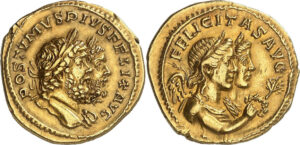
Postumus and Heracles
The fact that Postumus always had his legionaries in mind when choosing a coin motif is illustrated by coins like this one. The reverse depicts Felicitas as the goddess who influences the outcome of a battle. She is paired with winged Victoria. The message is: this is an emperor to whom Felicitas grants victories over your enemies. And this was the main justification of his rule. By then, an emperor could do without the Senate and a birthright as long as he remained victorious.
After all, according to the beliefs of the soldiers, it was still the gods who determined the outcome of a battle. Therefore, Postumus presented himself with his divine helper, Heracles. The latter was worshipped in Gaul and Germania. Postumus even created the cult of Hercules Deusoniensis, i.e. Hercules who had given him his first victory at Deuso (and whose booty his soldiers were allowed to keep).
Precious Metal and the Lack of It
Whereas Postumus had enough gold and silver to have high-quality aurei and antoninians minted, Emperor Gallienus struggled with a lack of precious metal after the loss of Spain and Britain. This can clearly be seen by his coins: while the 254/256 aureus minted in Rome offered as lot No. 513 in Künker’s auction 382 still has a weight of 2.85g, the one from 260/1 that was also minted in Rome – lot No. 514 of the same sale – has a weight of just 1.59g, the piece from 264-267 – lot No. 519 – even weighs only 1.09g! Even the coin that was distributed on the occasion of the 10th anniversary of his reign is only made of 3.45g of gold and thus weighs about half as much as the aurei of Postumus that were minted at about the same time.
The antoniniani of Gallienus also lost weight and precious metal content. The thin layer of silver that was created by a chemical process at the coin’s surface quickly disappeared when the coins were passed from hand to hand.
Nevertheless, there was no major inflation under Gallienus’ rule. He probably had so little precious metal that he was in no position to sustainably increase the money supply. His antoniniani – although underweight – seem to have been accepted at face value.
The Assassination of Gallienus and Postumus
Be it Postumus, Gallienus, Laelianus, Marius, Ingenuus, Odaenathus, Macrianus, Quietus, Regalianus and so on – none of them was able to protect the border and eliminate their competitors at the same time. They all hurried from one theater of war to the next.
Gallienus, too, would probably have continued to do so had he not been assassinated by a group of officers in Milan. This happened in late August or early September of 268. He was 50 years old when he died. The reason for his assassination? His assassins were probably loyal to the West and did not want to send urgently needed troops to the East. A deja vu?
Postumus survived for about half a year longer. He was murdered in the summer of 269 near Mainz – perhaps because he did not allow his legionaries to plunder the city. An ironic end: the man who rose to power because he provided his soldiers with booty was murdered because he wanted to deprive them of it.
Gallienus and Postumus, both of them could have told us a lot about constraints and pragmatism. They must have been fascinating characters. It would take a brilliant writer to adequately honor their courage of despair, their loyalty to Rome and their tragic fates.
Literature:
- Hartwin Brandt, Die Kaiserzeit. Munich (2021)
- Michael Geiger, Gallienus. Frankfurt am Main (2013)
- Klaus-Peter Johne (ed.), Die Zeit der Soldatenkaiser. Berlin (2008)
- Bernhard Schulte, Die Goldprägung der gallischen Kaiser von Postumus bis Tetricus. Aarau (1983)
You can find all coins of the Roger Wolf Collection in the Online catalogue.
For further information go to the Künker website.
Quite a controversy has arisen over coins that pose the question if Sponsianus was another usurper or just a fantasy?
Here you can read more about Postumus’ fascinating coinage.
Or, if his opponent suits you better, have a look at the coins of Gallienus.



